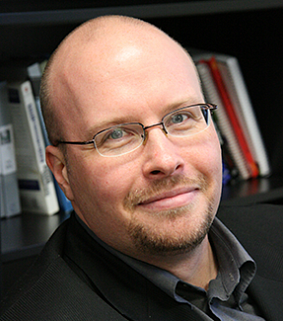2010 Eric Allen Outstanding Young Alum

As a student at Billings Senior High School in Billings, Montana, Rob Elder, then executive editor of his high school paper and the school’s literary magazine, met Oregon native Ken Kesey ’57. Kesey gave him the following advice: “Do what you love, do it now. Start early. If you want to be a journalist, dig in now. You’ll be so far ahead of the crowd later—it won’t matter.”
“Good advice, and I’ve followed it ever since,” says Elder, who also followed Kesey to the UO, receiving both the Lucien P. Arant and Arlyn Cole scholarships from the School of Journalism and Communication as a freshman. While a student, Elder wrote for the Oregon Daily Emerald, served as associate editor of Flux magazine, and as associate editor and later publisher of the student-run independent newspaper Oregon Voice, where he interviewed “everyone from David Foster Wallace and Oliver Stone to Maxine Hong Kingston and a very difficult Kurt Vonnegut.” He earned two Hearst Awards for writing, a Centurion Award for extraordinary leadership and service, and was a member of the Friars.
He also seized every off-campus opportunity to hone his craft, compiling an impressive list of internships at radio and television stations, movie sets, and newspapers throughout the U.S., including Premiere magazine, where he was an editorial assistant; and The Oregonian, The Dallas Morning News, and the Milwaukee Journal Sentinel, where he was an entertainment writer. When the movie Without Limits filmed in Eugene in 1996, he signed on as a publicity intern. Soon after graduation, he landed a one-year spot at the Chicago Tribune as an arts writing resident—one that lasted almost nine years. In the meantime, he contributed chapters to a number of edited collections—including A Friendly Game of Poker (Chicago Review Press, 2003), Graphic Communications Today (Thomson Delmar Learning, 2003), and The Neil Gaiman Reader (Wildside Press, 2007), among others. His first edited collection, John Woo: Interviews (University Press of Mississippi, 2005, Conversations with Filmmakers Series), was the first English-language oral history of the legendary filmmaker’s life and work.
He also began teaching, first at Columbia College, Chicago and later at Northwestern University’s Medill School of Journalism. During that time, he continued to write for the Chicago Tribune, interviewing FBI undercover agent Robert Hamer and writing investigative pieces on the Unabomber, Ted Kaczynski, and “cantankerous” author Harlan Ellison. His work also appeared in The New York Times and The Boston Globe.
Elder left the Chicago Tribune in 2009 and founded the Web 2.0 company Odd Hours Media. It launched the user-generated sites It Was Over When: Tales of Romantic Dead Ends and It Was Love When: Tales from the Beginning of Love. Both sites went viral very quickly, attracting more than 1 million hits within a few months.
Elder’s most recent book, Last Words of the Executed (University of Chicago Press, 2010), was released in June and received extremely positive reviews from The Economist, The New York Review of Books, and Harper’s Magazine, to name a few. In the book’s foreword, the late Studs Terkel called it “a remarkable, deeply moving assemblage.” Sister Helen Prejean (author of Dead Man Walking) also praised the project, calling it “a dangerous book.”
He is currently working on two more books—The Film That Changed My Life— interviews with filmmakers about the movie that made them want to direct, will be released in early 2011—and The Best Films You’ve Never Seen, which he calls “a complete rewrite of cinema history, wherein directors champion a much reviled or little-seen cinematic gem,” in 2012.
In the spring of 2010, Elder was recruited by AOL as a regional editor to build and run hyper-local news sites for Patch.com, which he calls “a dashing, bold adventure. As I write this we have almost 100 sites, and we’ll have hundreds more in the following months. It’s exciting, exhausting work.”
Return to Eric Allen Outstanding Young Alumni »
